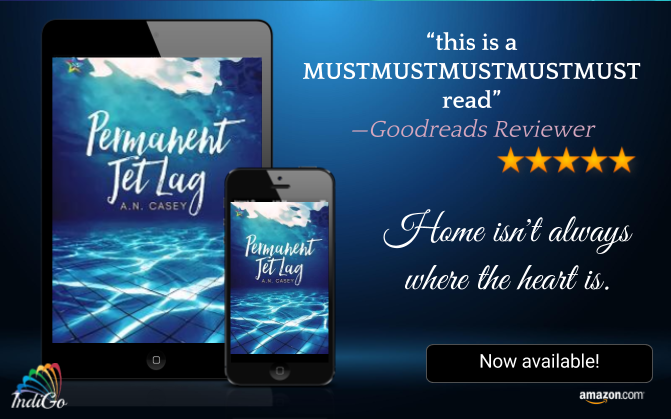Title: Permanent Jet Lag
Author: A.N. Casey
Publisher: NineStar Press
Release Date: May 29, 2017
Length: 87000
Genre: Contemporary, literary, Student, family, coming of age, alcohol use, illness/disease, tear-jerker
Add to Goodreads

Synopsis
Nineteen-year-old Lucas Burke prefers being alone. He likes the silence, and he loves not having to care about anyone else’s problems: the less he’s forced to feel, the better. But after a year of college-induced isolation from everyone he used to know, the wedding of a former classmate sends Lucas back home, and that means reconciling with a group of friends that now might as well be strangers.
His sister hardly knows him, his “genius” best friend is nothing more than an addict, and his ex-boyfriend is still in a coma. All the while, wedding preparations send Lucas head first into a relationship with the groom’s best man—a recently cancer-free ex-Olympian who can’t stop talking.
Lucas knows that if he wants to survive the summer, he’ll have to learn to be a friend again, but it doesn’t come easy, and it might already be too late.
Character Bio Lucas
Permanent Jet Lag is a group story, the tale of old friends gotten back together, of the new adventures of misfit high school buddies and their new college love interests. It’s a team effort. This novel could not be complete without its full cast of characters, but its narrator is the one character who wishes he could be alone: Lucas Coleman, the self-decided outcast, the want-to-be loner, the one who almost got away.
Lucas should not have been my first pick to tell this story, and that’s mostly because he hates stories. Annoyed by the world and distrusting, Lucas doesn’t talk much and he begins the novel determined to push away every friend he ever had. He likes to be alone, likes the quiet, likes the way his world looks when no one is depending on him—because the last time that happened, he let everyone down.
Lucas chooses every word carefully, keeps his friends at a distance, and loves sparingly, and that’s what made him so interesting to write, what made him the perhaps unusual but perfect choice to tell this story. He is a narrator who doesn’t want to be a narrator, who doesn’t want to be in the story at all, and so his story is the finding of story, the choice between putting himself back into the narrative or becoming the omniscient observer, disappearing into oblivion.
The story opens as Lucas packs up his belongings and moves out of his college dorm room. He heads back to the town where he grew up, where his old friends all live—though he has hardly talked to any of them in a year. It’s the cross roads between the New Self and Memory Lane, that moment where one becomes an adult—their own person—but childhood isn’t quite done with them just yet.
I began writing Permanent Jet Lag after I became obsessed with apathy, particularly in the form of repression and how it operates as a defense mechanism. I wondered what it would be like to dive into the mindset of someone who didn’t want to be understood, to try and feel the feelings of someone who did not want to have feelings. It was also a study on what it means to start over, and where “home” fits in once you’ve reinvented yourself.
Can you ever truly move on if you haven’t dealt with the past? Are we really shaped by our experiences, or can we reinvent ourselves whenever we choose?
This is the college experience: going out on our own for the first time and learning what it means to be a person isolated from our family, from our community, from our memories. For me, this was the most exhilarating and nerve wracking part of being 18+: deciding who I was going to be on my own terms. Because college truly gives you that opportunity, a real chance to start over, to form a new self or new reputation because suddenly, after often twelve school years in the company of the same classmates, you don’t know anyone. It can be both terrifying and wonderful.
Lucas is a young adult trying to figure out his place in the world, but he hopes to do it without assistance, to find where he belongs in the grand scheme of things without being compared to those around him. And that becomes the question of the novel: can we really stay isolated in a social world? Is love worth the risk of heartbreak?
Lucas has a lot to learn. He’s the protagonist and the villain in his own story. Permanent Jet Lag is the story of one summer in the life: one summer to find out what he truly wants, who truly matters, and how the hell he moves forward from here.
Permanent Jet Lag
A.N. Casey © 2017
All Rights Reserved
Chapter One
96 Days Before
On the last day of my freshman year of college, my parents—dressed head to toe in the obnoxious green and gold colors of my school—arrived on the threshold of my dorm room with five extra-large boxes for packing, a tin of mom-baked chocolate chip cookies to cure my assumed “home sick blues,” and two snippets of hometown gossip for my ears only. When you leave home for college, there’s a certain assumption that says you will learn to be independent. You do your own laundry, you buy your own meals, and your parents never come knocking on your door to ask if you’ve done your homework or to ground you for coming home past curfew. You’re alone—blissfully independent and free.
My mother had other ideas. Ideas that filled the voicemail on my cell phone until I could no longer receive friends’ missed calls. Ideas that left a pile of cookie tins in the corner of the room and a dozen more care packages under the bed. Even now, as I finished the bulk of my packing, a poorly knit mom-made sweater hung limp over the side of the latest care package, threads unraveling and fraying in every direction with a note pinned to its sleeve with words I could not remember—words I likely never read.
My roommate sat on the other side of the room upon his stripped-down bed, munching away at the first cookie handed to him. He wore a thick pair of headphones that flattened his usually unruly brown hair. Though the cord was not connected to anything, my mother seemed pleased with this sense of security and began her “top secret” gossip. As though my roommate would care at all about the small-town news of Franklin Creek, California.
“Rylie Graham is getting married!” she squealed. Despite her rising age, my mother’s face still lit up with all the excitement and energy of the young woman I could just barely remember from the photographs on the walls at home. Today, my mother was plump and nearly always flushed in her cheeks. The freckles on her nose were faded underneath a splotchy tan that extended only to the bottom of her neck, and her clothes, though neatly pressed, still appeared crumpled by her slouch and the endless movement of her limbs. She went on and on about the wedding, the beautiful invitations, and the color schemes she hoped they’d use, how she could still remember Rylie as a baby, crawling around at the neighborhood block parties.
I was already aware of this news, of course. The invitation had arrived in the mail two days ago, vividly pink with a handful of red hearts and almost a dozen purple and green flowers decorating the edges. Unless the groom was a botanist, there was no inkling of his presence in the design. To top it off, at the very bottom of the paper, beneath the RSVP notification, was a dried crimson lipstick mark. Nine months since I’d seen her, and I could still vividly imagine Rylie prepping her mouth with that darkened color she had so adored in high school and kissing each invitation one by one.
The invitation was now crumpled up in my suitcase with the rest of my belongings, but the image of it had not left my mind for a second.
“Isn’t it great, Lucas?” my mother asked, and I nodded. “She’ll look so beautiful as a bride.” Another nod. “Just wait until you meet the groom. What a charming young man.” At this, I fidgeted with the zipper on my luggage and forced a smile.
My father, lounging lazily upon my still-sheeted bed, gave me a knowing smile over the top of his third cookie. My mother promptly smacked it out of his hand.
“That’s enough, Tim. Didn’t you hear a word the doctors said? I think one heart attack is quite enough for one year, don’t you?”
“I thought two would make a more interesting story at this year’s Christmas party,” my father replied, grinning.
And so began an argument that lasted through the remainder of my packing, the long trek downstairs, and into the oversized van waiting for us in the parking lot. It continued as my father stabbed the key into the ignition, as my mother pulled on her seat belt, and as I peered through the window and watched San Francisco—all its big buildings and bustling bridges—disappear into the night.
By the time we pulled into the driveway of my childhood home, my parents were just progressing toward the makeup phase of their disagreement, or, as I’d dubbed it over the years, the honeymoon period. They sat, arms tangled in the front seat, kissing and whispering loving platitudes into each other’s mouths with such nauseating enthusiasm that sitting through it was quite like staring at the sun: tolerance came in small doses. I left the car and dragged my luggage up the porch steps alone.
I had come home exactly twice since leaving for college, once for spring break and once after my father’s heart attack, and I was greeted the same each time. Homecoming generally went like this: my oldest sister, now sixteen, would nod her head in my direction over the top of her cell phone, give me a hug if I came close enough, and then resume her texting. My brothers, identical in all but their clothing, would rush in for the tackle. And my youngest sister would wave from the couch—a simple twist of her hand—and then return to her TV show. Today it was an old rerun about a teenage spy, and because the theme song was particularly catchy, the wave was even shorter than normal, barely a twitch of her fingertips.
I disappeared into my room.
From the window of my dorm room in the mornings, I could see the wide expanse of the San Francisco landscape for miles, a hundred buildings huddled together against the fading fog, life bustling below. From the window of my hometown bedroom, I could see the neighbor’s pool. A thoroughly unexciting, lifeless pool. As summer had not technically begun, the water that would soon promise endless good times and relief from the heat was still currently abandoned. A heavy pile of leaves covered much of the surface, but through the spaces between, I could make out a glimpse of the water—a murky, untouched green.
Rylie called at half past eleven while I was cleaning the windowsill for the second time. Her voice was shrill and rushed as she screamed into my ear, “Why didn’t you tell me you were home? I had to hear it from my mom, who heard it from your mom, and I feel like I’m in a weird stupid sitcom, because I’m not supposed to be hearing gossip from your mother, Lucas. You’re supposed to tell your friends when you come home. Clay is pissed.”
As she spoke, I tucked the phone between my shoulder and ear. Downstairs, my mom was yelling at the twins, and Dad was swearing about the score of a baseball game. I retreated farther into my room and closed the door.
“Sorry,” I said.
“Sorry?” Rylie let out a long, exasperated sigh, and I thought I could hear her nails tapping against the back of her phone. “Will you meet me somewhere? I haven’t seen you in ages, and everyone misses you. Please?”
“Okay.”
“Is this how this is going to be now? One-worded conversations?”
“Probably.”
Rylie laughed, a deep, chest-rattling sort of sound that in no way matched the high, squeaky pitch of her voice. It was for reasons like this I’d stopped trying to understand her in the third grade.
“You’re an ass, Lucas. Meet me at the flower shop across from the grocery store, okay? Ten minutes, don’t be late. Oh, and Todney is going to be there. I can’t wait for you to meet him. Don’t be late.”
“We have a grocery store?”
“Goodbye, Lucas.”
Purchase
NineStar Press | Amazon | Smashwords | Barnes & Noble | Kobo
A.N. Casey is a Californian born and bred writer with very few interests beyond the literary. As a former copywriter and a current freelance writer and editor, Casey was asked what he likes to do outside of writing for work and responded only with: “write more”—much to the disappointment of his colleagues who had hoped he might be more interesting. His few attempts to leave his computer or notebooks behind have led to an interest in camping, traveling, and very bad attempts at cooking. He is currently studying to become a teacher where he hopes his fondness for the red pen will not make him too many enemies. Above all, Casey believes that storytelling has the power to shape lives, and that young people deserve to see themselves represented on the page in every shape and form until no one is left feeling alone in this wide and confusing world. You can find A.N. on Tumblr.
5/29 MM Book Escape
5/29 MM Good Book Reviews
5/30 Stories That Make You Smile
5/31 Divine Magazine
5/31 millsylovesbooks
5/31 Love Bytes Reviews
6/1 Scattered Thoughts and Rogue Words









I loved the excerpt! Sounds like a fun read, though I guess the reference to his ex boyfriend and the former friends who now are stranger explains much about his reticence at being home again.
This book sounds great. Thanks for the excerpt.